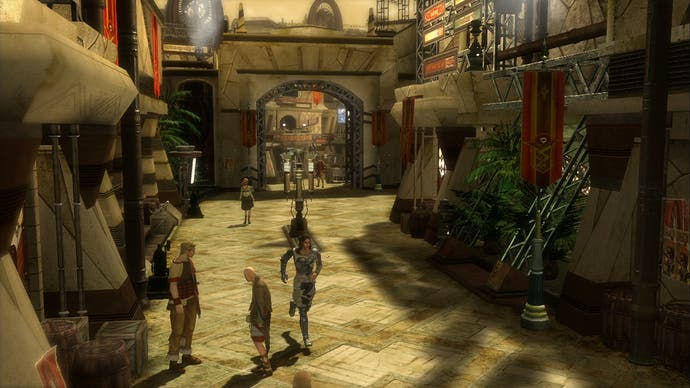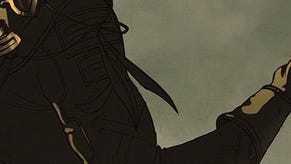Lost Odyssey
Get Lost. In a good way.
Like any Japanese RPG, the true appeal of Lost Odyssey can be boiled down to its story, and its game mechanics. Lost Odyssey's mechanics are unreconstructed and utterly old-school, but they're polished to within an inch of their decades-long life, benefiting from modern-day tweaks. It's astonishing how effective the sprint button is, for example, taking much of the pain out of all the exploration and backtracking. And there are all sorts of neat touches, from a cube-based music mini-game to a trashcan-dwelling, gift-giving creature called a Pipot, who pops up every now and again. Most of the polish, however, is to be found in Lost Odyssey's combat system. It is, essentially, the usual blend of turn-based attacks using elemental magic or upgradeable weapons, but there are a few new features that improve it dramatically.
The first, and perhaps least important, is the guard system, in which the front rank of characters create a barrier that protects those located behind them. Not that unusual in an RPG, but here it's formalised, with the barrier in question given a name and some hit-points, to make its impact on your strategy more obvious. More important is the second feature, the skill system, because it goes some distance to alleviating the sort of fatigue traditionally engendered by random encounters. One of the best things about Lost Odyssey is the rapid pace of character progression, with almost every random encounter yielding some new achievement - mainly because of the way the skill system works. Characters learn skills either from other characters or from equipping items, and generally it only takes one or two encounters for at least one of your characters to learn something new. What's more, the sheer variety of skills to learn, and the limited number that can be equipped at any one time, lends the combat system an ever deeper, more rewarding complexity.

That complexity is further enhanced by the final feature: the ring system, which adds a rhythm-action element to the otherwise standard turn-based battles. Throughout the game you can create and equip magic rings to your weapons, giving them various extra powers, but to trigger them you need to press a button at just the right time during your character's attack. As with the skill system, it can inspire a fair amount of micro-management if you want to tailor your equipment and skills to specific enemies. That might not be to everybody's taste, but it's actually pretty satisfying to delve into the further reaches of the system and, in any case, you're rarely compelled to. Indeed, if micro-management item synthesis and skill-swapping isn't your thing you can get by perfectly adequately by just upgrading every now and then.
Those are the mechanics. As for the story, during its better moments it scales emotional and narrative heights that many other games simply cannot match. The plot is so essential to the appeal of the game that it's impossible to go into too much detail without ruining the experience, but it's fair to say it contains the usual mix of geopolitics, warring states, political intrigue, and magic technology. It opens up in a pretty linear fashion until there comes a point at which it dramatically splinters, taking off in various different directions. It's unconvincing in some places, and finds itself home to many familiar failings - brattish kids, over-emotionality, and too many twee bits (especially at the end of the second disc, which consists of a good ten minutes of people crying about someone you have little reason to care about) - but it also contains moments of unparalleled magnificence.

Many of those moments are contained within the Shigematsu short stories. These dreams add so much more depth and emotional resonance to the main storyline even if, like me, you're so stone-hearted that you fail to cry while reading any of them. It would be interesting, in fact, to know which came first: the stories or the story. Did Shigematsu's stories inspire the main narrative thrust? Or was he asked to write them to fill in the gaps? Either way, they add another dimension to the storytelling, so while an amnesiac hero might have done before, the emotional richness of the story is fairly unparalleled by any other JRPG. Certainly, no other game has managed to capture such a breathtakingly elegiac tone, or created such a compelling account of the immortal longing for mortality.
And that, really, is the reason that Lost Odyssey manages to overcome its many flaws. If you just fundamentally don't like the genre, then there's a chance that Lost Odyssey will fail to convert you. If you're too attached to the sorts of innovation introduced by the likes of Final Fantasy XII, there's a chance that it's just too old-fashioned for your cutting-edge tastes. But if you've got the patience to sit through its slow build-up, and if you're open-minded enough to allow it to transport you, then it will take you to places that other JRPGs haven't even dreamed of visiting.



